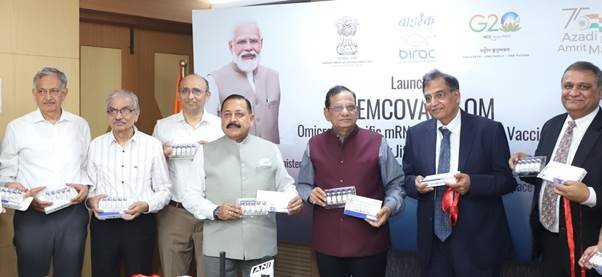India’s first mRNA vaccine was launched on Saturday by Dr Jitendra Singh, Union Minister of State (Independent Charge) for Science and Technology.
GEMCOVAC® -OM, an Omicron-specific mRNA-based Booster vaccine had been developed using the indigenous platform technology by Gennova, with funding support from Department of Biotechnology (DBT) and Biotechnology Industry Research Assistance Council (BIRAC), the Ministry of Science and Technology informed.
Vaccine had got approval from the office of the Drug Control General of India (DCGI) for Emergency Use Authorization (EUA) recently.
“I take great pride in DBT fulfilling its mission yet again – enabling technology-driven entrepreneurship through creating this indigenous mRNA-platform technology. We have always supported technology-driven innovation towards the creation of a ‘future-ready’ technology platform in line with the Prime Minister’s vision of Aatmanirbharta,” said Dr Jitendra Singh.
Download Nagaland Tribune app on Google Play

GEMCOVAC® -OM is the fifth vaccine developed with support from Mission COVID Suraksha implemented by DBT and BIRAC under Atmanirbhar Bharat 3.0 package of Govt. of India for accelerated development of Indian COVID-19 vaccines.
The Union minister highlighted that within a year of implementation, the Mission Covid Suraksha demonstrated major achievements, such as (i) Development of the world’s first DNA Vaccine for COVID-19, and (ii) Supporting the development of the nation’s first mRNA Vaccine and intranasal vaccine candidates and a subunit vaccine against COVID-19.
GEMCOVAC® -OM is a thermostable vaccine and does not require ultra-cold chain infrastructure used for other approved mRNA- based vaccines.
“This innovation makes it easy for last mile deployment in our country. The existing supply chain infrastructure is sufficient to deploy this vaccine,” said Dr Jitendra Singh, adding, “Its unique feature is that this vaccine can be administered without a needle injection.”
The GEMCOVAC® -OM vaccine is delivered intra-dermally using a needle-free injection device system and in study participants it generated significantly higher immune responses. The clinical outcome demonstrates the need for variant-specific vaccines for desired immune response.

